Report: Analysis of Ethics Theories and Royal Commission Application
VerifiedAdded on 2023/02/01
|18
|3869
|36
Report
AI Summary
This report offers a comprehensive analysis of ethical theories, focusing on teleology, egoism, utilitarianism, justice ethics, virtue ethics, and relativism. It explores the application of these theories within organizations, emphasizing the importance of ethical conduct. The report delves into the complexities of ethical egoism and utilitarianism, examining their implications and potential conflicts. Furthermore, it evaluates the suitability of different ethical theories for the Royal Commission, advocating for the adoption of egoism and utilitarianism to foster ethical behavior among employees. The report also explains the APES 110 code of ethics and its application to freedom insurance sales agents, offering practical insights into ethical decision-making and professional conduct. The discussion includes the importance of ethical conduct, various ethical issues, and the application of ethical theories in different scenarios. Overall, the report provides a framework for understanding and implementing ethical practices within organizations.
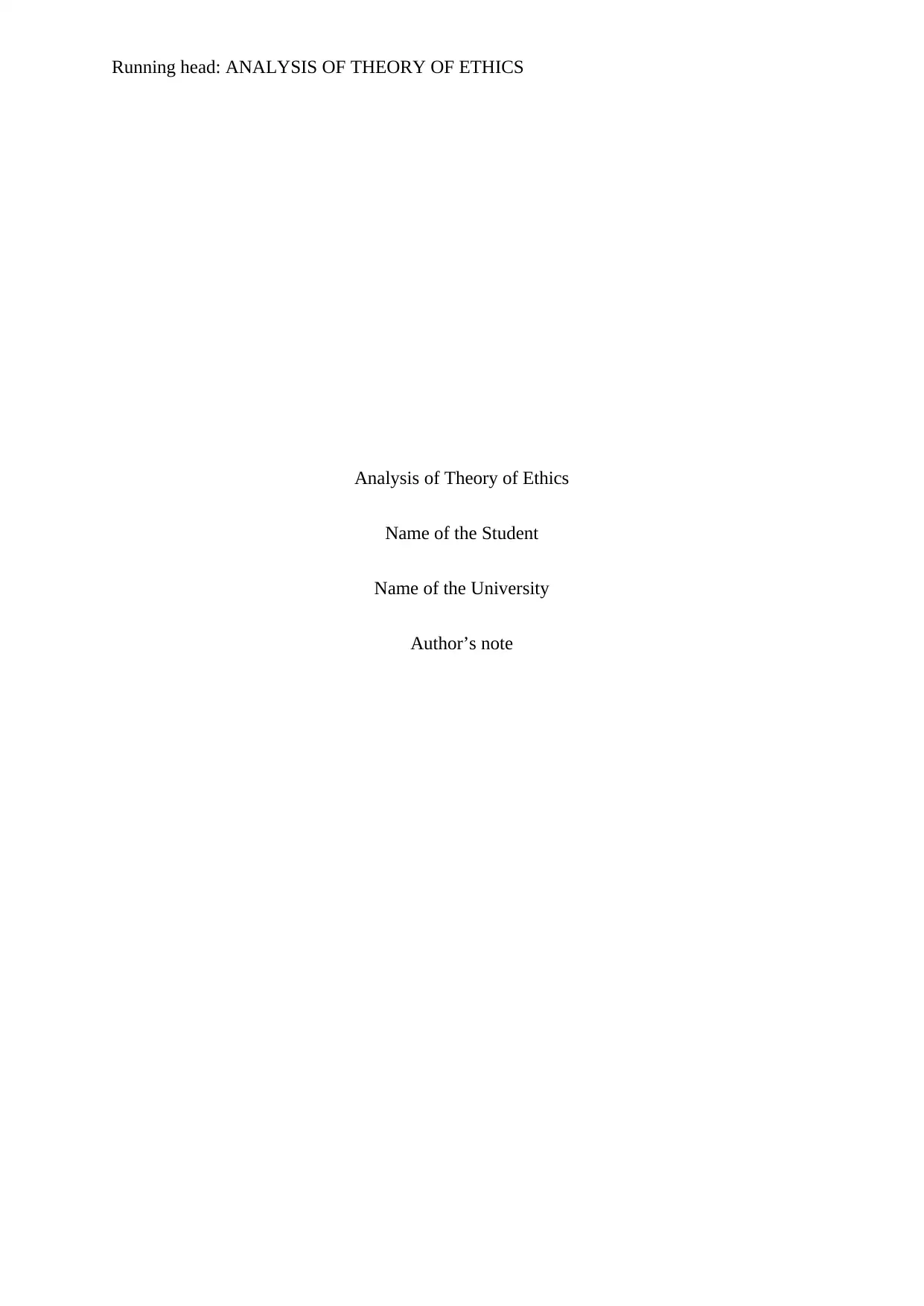
Running head: ANALYSIS OF THEORY OF ETHICS
Analysis of Theory of Ethics
Name of the Student
Name of the University
Author’s note
Analysis of Theory of Ethics
Name of the Student
Name of the University
Author’s note
Paraphrase This Document
Need a fresh take? Get an instant paraphrase of this document with our AI Paraphraser
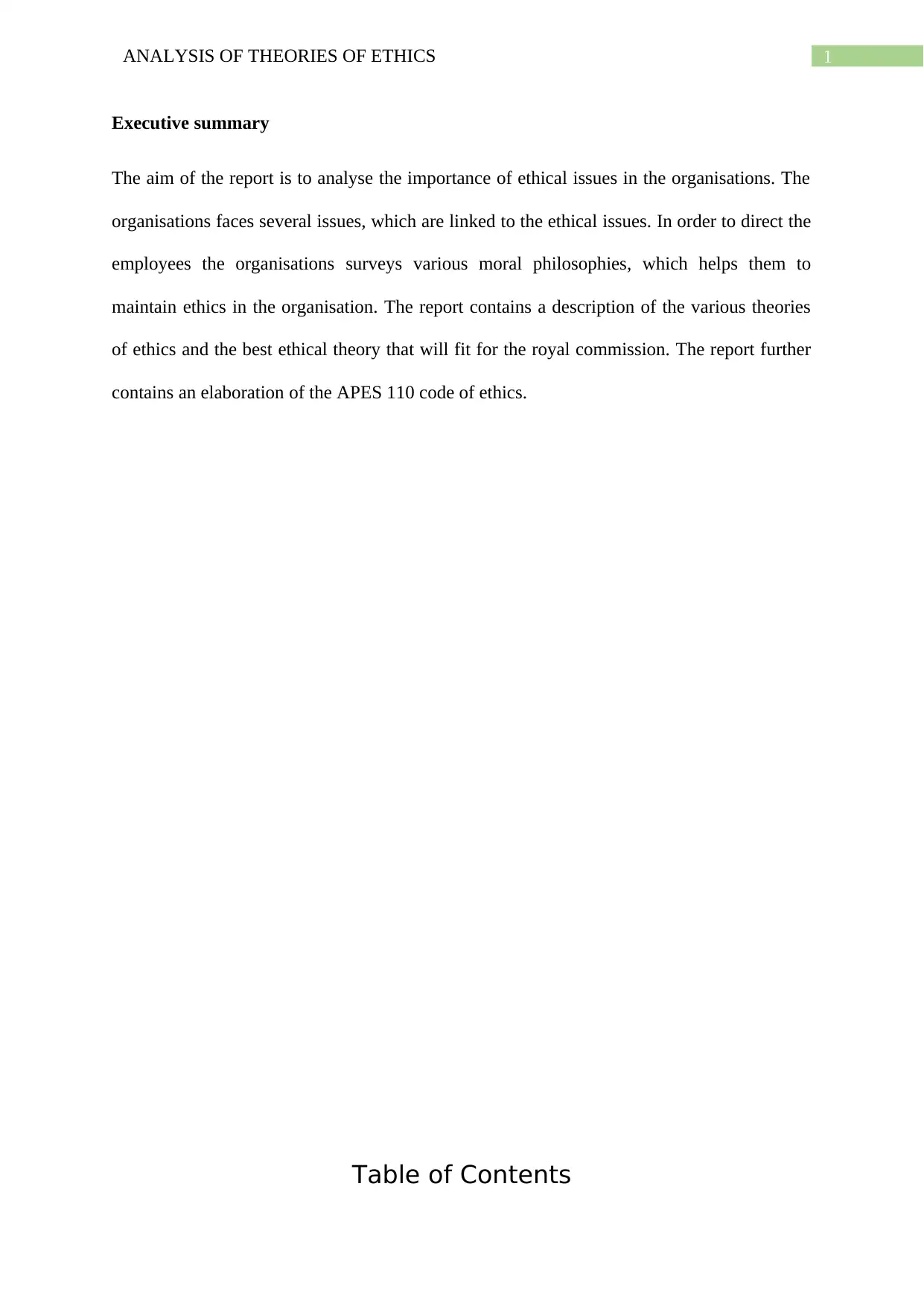
1ANALYSIS OF THEORIES OF ETHICS
Executive summary
The aim of the report is to analyse the importance of ethical issues in the organisations. The
organisations faces several issues, which are linked to the ethical issues. In order to direct the
employees the organisations surveys various moral philosophies, which helps them to
maintain ethics in the organisation. The report contains a description of the various theories
of ethics and the best ethical theory that will fit for the royal commission. The report further
contains an elaboration of the APES 110 code of ethics.
Table of Contents
Executive summary
The aim of the report is to analyse the importance of ethical issues in the organisations. The
organisations faces several issues, which are linked to the ethical issues. In order to direct the
employees the organisations surveys various moral philosophies, which helps them to
maintain ethics in the organisation. The report contains a description of the various theories
of ethics and the best ethical theory that will fit for the royal commission. The report further
contains an elaboration of the APES 110 code of ethics.
Table of Contents
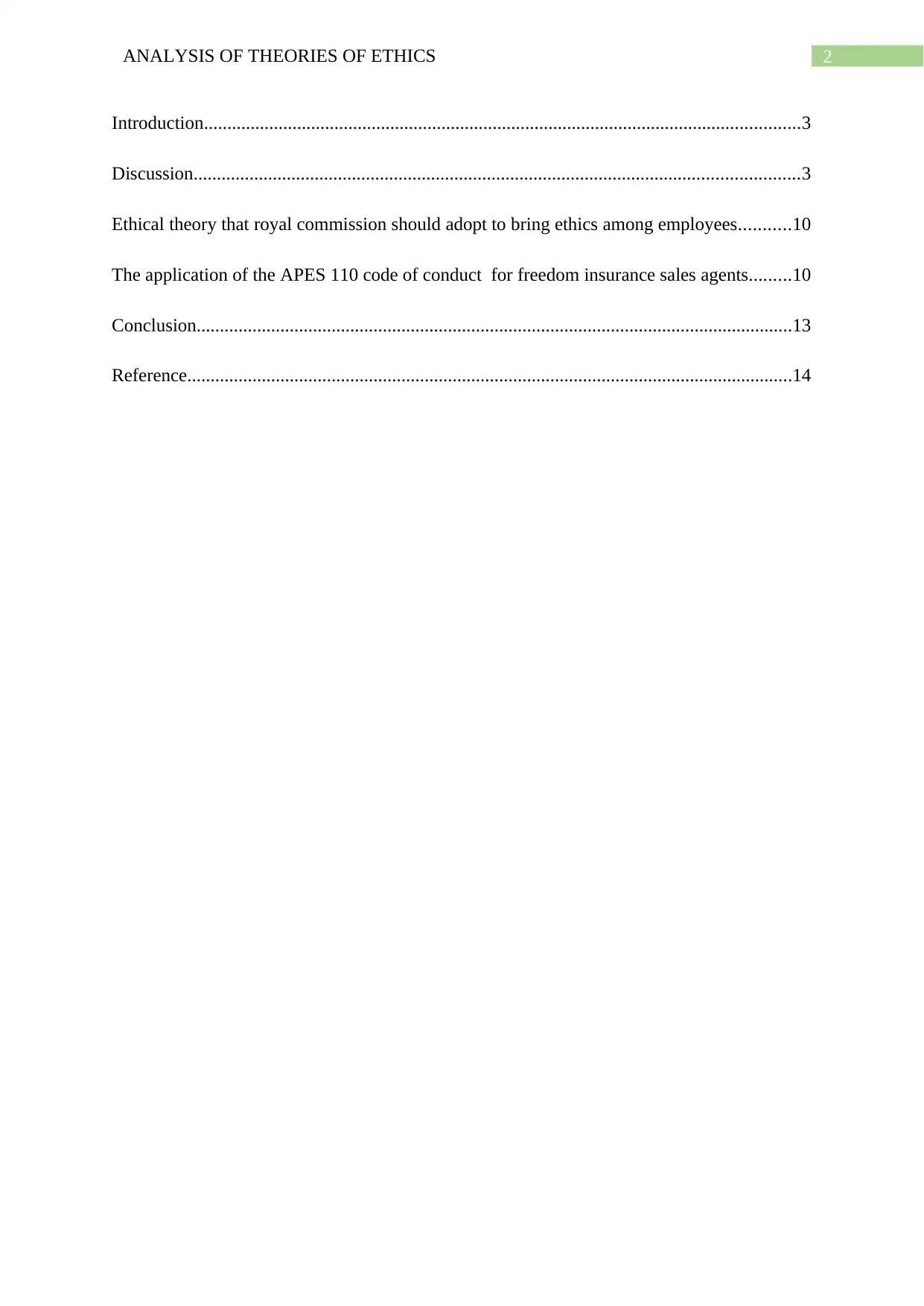
2ANALYSIS OF THEORIES OF ETHICS
Introduction................................................................................................................................3
Discussion..................................................................................................................................3
Ethical theory that royal commission should adopt to bring ethics among employees...........10
The application of the APES 110 code of conduct for freedom insurance sales agents.........10
Conclusion................................................................................................................................13
Reference..................................................................................................................................14
Introduction................................................................................................................................3
Discussion..................................................................................................................................3
Ethical theory that royal commission should adopt to bring ethics among employees...........10
The application of the APES 110 code of conduct for freedom insurance sales agents.........10
Conclusion................................................................................................................................13
Reference..................................................................................................................................14
⊘ This is a preview!⊘
Do you want full access?
Subscribe today to unlock all pages.

Trusted by 1+ million students worldwide
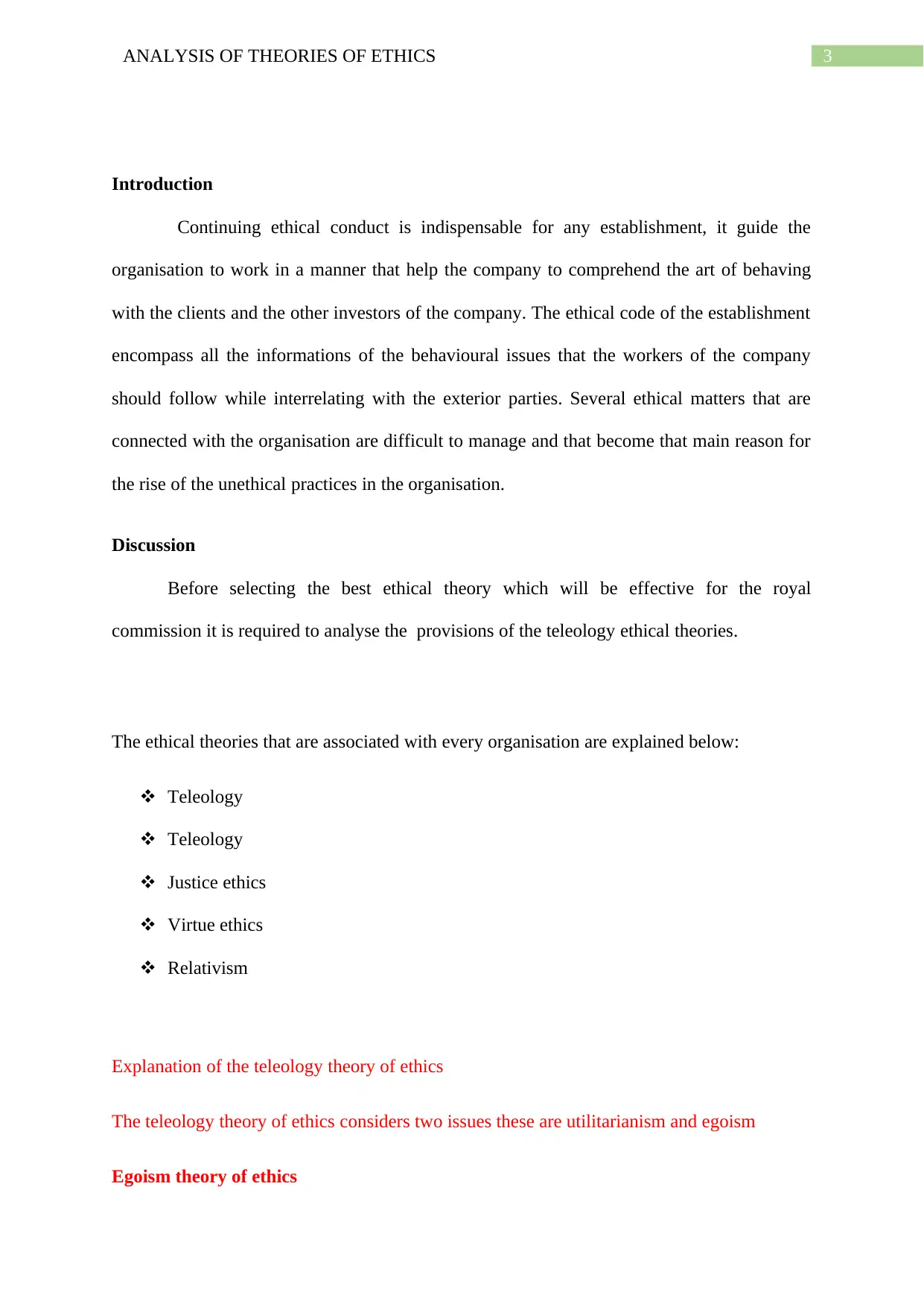
3ANALYSIS OF THEORIES OF ETHICS
Introduction
Continuing ethical conduct is indispensable for any establishment, it guide the
organisation to work in a manner that help the company to comprehend the art of behaving
with the clients and the other investors of the company. The ethical code of the establishment
encompass all the informations of the behavioural issues that the workers of the company
should follow while interrelating with the exterior parties. Several ethical matters that are
connected with the organisation are difficult to manage and that become that main reason for
the rise of the unethical practices in the organisation.
Discussion
Before selecting the best ethical theory which will be effective for the royal
commission it is required to analyse the provisions of the teleology ethical theories.
The ethical theories that are associated with every organisation are explained below:
Teleology
Teleology
Justice ethics
Virtue ethics
Relativism
Explanation of the teleology theory of ethics
The teleology theory of ethics considers two issues these are utilitarianism and egoism
Egoism theory of ethics
Introduction
Continuing ethical conduct is indispensable for any establishment, it guide the
organisation to work in a manner that help the company to comprehend the art of behaving
with the clients and the other investors of the company. The ethical code of the establishment
encompass all the informations of the behavioural issues that the workers of the company
should follow while interrelating with the exterior parties. Several ethical matters that are
connected with the organisation are difficult to manage and that become that main reason for
the rise of the unethical practices in the organisation.
Discussion
Before selecting the best ethical theory which will be effective for the royal
commission it is required to analyse the provisions of the teleology ethical theories.
The ethical theories that are associated with every organisation are explained below:
Teleology
Teleology
Justice ethics
Virtue ethics
Relativism
Explanation of the teleology theory of ethics
The teleology theory of ethics considers two issues these are utilitarianism and egoism
Egoism theory of ethics
Paraphrase This Document
Need a fresh take? Get an instant paraphrase of this document with our AI Paraphraser
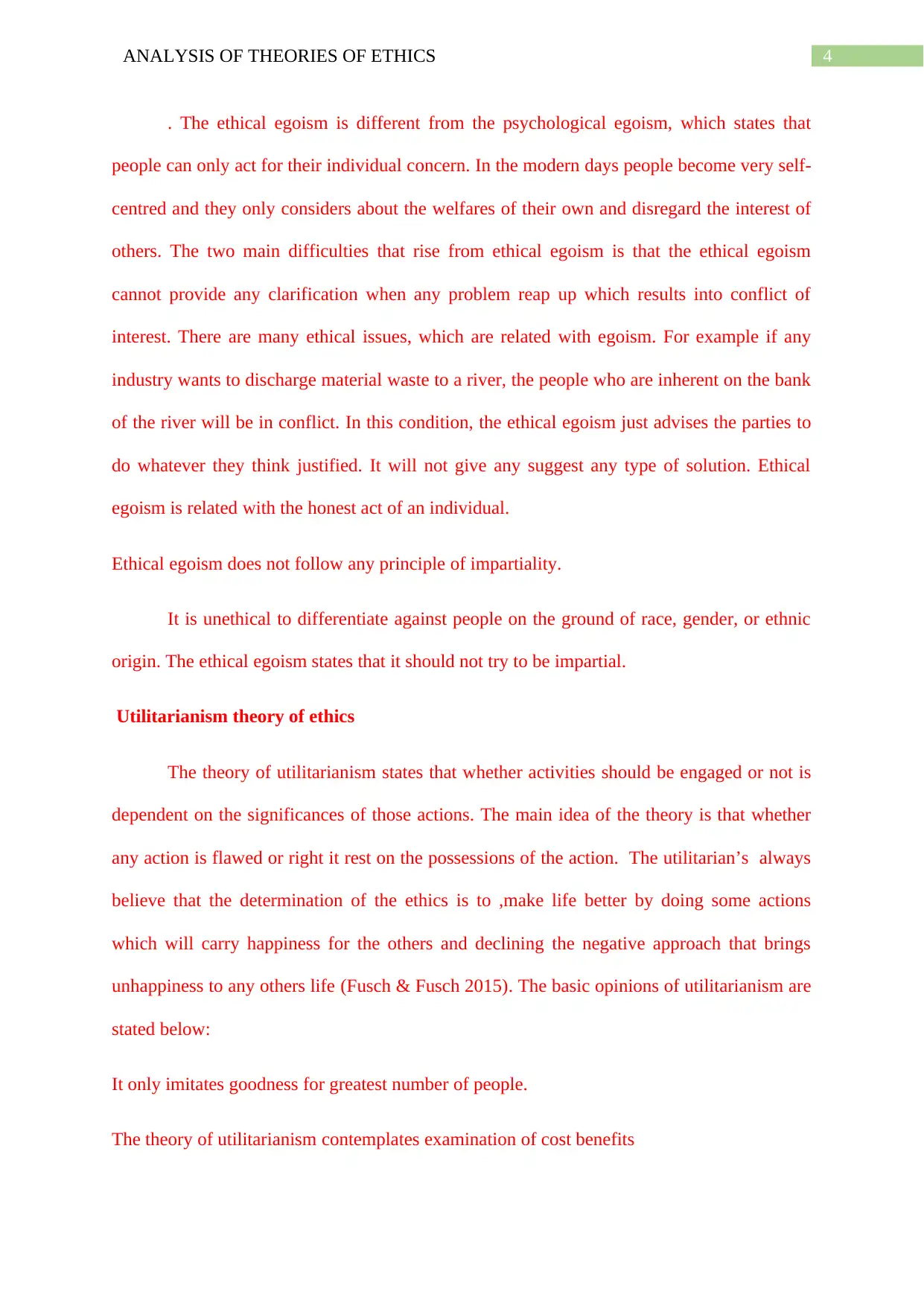
4ANALYSIS OF THEORIES OF ETHICS
. The ethical egoism is different from the psychological egoism, which states that
people can only act for their individual concern. In the modern days people become very self-
centred and they only considers about the welfares of their own and disregard the interest of
others. The two main difficulties that rise from ethical egoism is that the ethical egoism
cannot provide any clarification when any problem reap up which results into conflict of
interest. There are many ethical issues, which are related with egoism. For example if any
industry wants to discharge material waste to a river, the people who are inherent on the bank
of the river will be in conflict. In this condition, the ethical egoism just advises the parties to
do whatever they think justified. It will not give any suggest any type of solution. Ethical
egoism is related with the honest act of an individual.
Ethical egoism does not follow any principle of impartiality.
It is unethical to differentiate against people on the ground of race, gender, or ethnic
origin. The ethical egoism states that it should not try to be impartial.
Utilitarianism theory of ethics
The theory of utilitarianism states that whether activities should be engaged or not is
dependent on the significances of those actions. The main idea of the theory is that whether
any action is flawed or right it rest on the possessions of the action. The utilitarian’s always
believe that the determination of the ethics is to ,make life better by doing some actions
which will carry happiness for the others and declining the negative approach that brings
unhappiness to any others life (Fusch & Fusch 2015). The basic opinions of utilitarianism are
stated below:
It only imitates goodness for greatest number of people.
The theory of utilitarianism contemplates examination of cost benefits
. The ethical egoism is different from the psychological egoism, which states that
people can only act for their individual concern. In the modern days people become very self-
centred and they only considers about the welfares of their own and disregard the interest of
others. The two main difficulties that rise from ethical egoism is that the ethical egoism
cannot provide any clarification when any problem reap up which results into conflict of
interest. There are many ethical issues, which are related with egoism. For example if any
industry wants to discharge material waste to a river, the people who are inherent on the bank
of the river will be in conflict. In this condition, the ethical egoism just advises the parties to
do whatever they think justified. It will not give any suggest any type of solution. Ethical
egoism is related with the honest act of an individual.
Ethical egoism does not follow any principle of impartiality.
It is unethical to differentiate against people on the ground of race, gender, or ethnic
origin. The ethical egoism states that it should not try to be impartial.
Utilitarianism theory of ethics
The theory of utilitarianism states that whether activities should be engaged or not is
dependent on the significances of those actions. The main idea of the theory is that whether
any action is flawed or right it rest on the possessions of the action. The utilitarian’s always
believe that the determination of the ethics is to ,make life better by doing some actions
which will carry happiness for the others and declining the negative approach that brings
unhappiness to any others life (Fusch & Fusch 2015). The basic opinions of utilitarianism are
stated below:
It only imitates goodness for greatest number of people.
The theory of utilitarianism contemplates examination of cost benefits
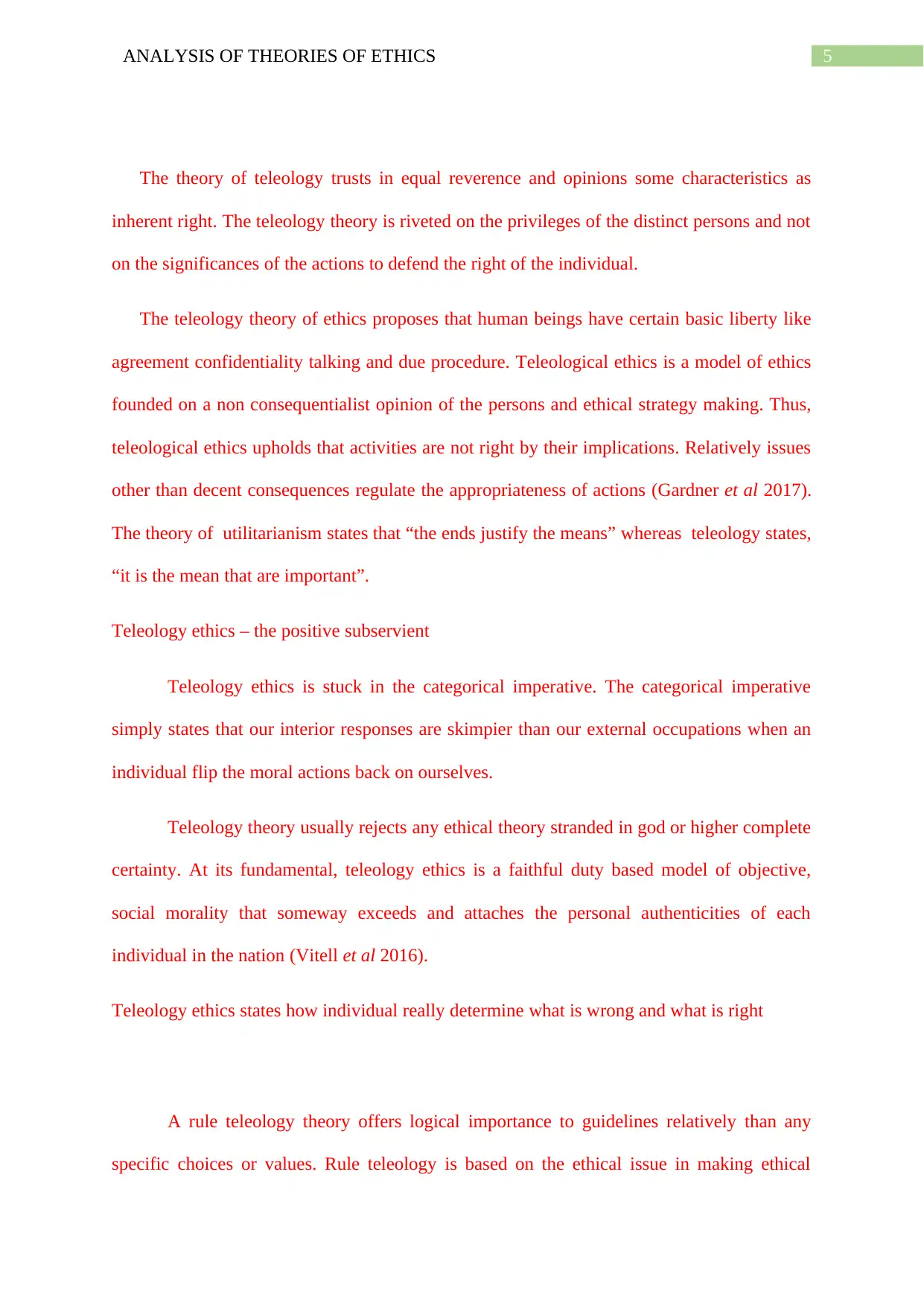
5ANALYSIS OF THEORIES OF ETHICS
The theory of teleology trusts in equal reverence and opinions some characteristics as
inherent right. The teleology theory is riveted on the privileges of the distinct persons and not
on the significances of the actions to defend the right of the individual.
The teleology theory of ethics proposes that human beings have certain basic liberty like
agreement confidentiality talking and due procedure. Teleological ethics is a model of ethics
founded on a non consequentialist opinion of the persons and ethical strategy making. Thus,
teleological ethics upholds that activities are not right by their implications. Relatively issues
other than decent consequences regulate the appropriateness of actions (Gardner et al 2017).
The theory of utilitarianism states that “the ends justify the means” whereas teleology states,
“it is the mean that are important”.
Teleology ethics – the positive subservient
Teleology ethics is stuck in the categorical imperative. The categorical imperative
simply states that our interior responses are skimpier than our external occupations when an
individual flip the moral actions back on ourselves.
Teleology theory usually rejects any ethical theory stranded in god or higher complete
certainty. At its fundamental, teleology ethics is a faithful duty based model of objective,
social morality that someway exceeds and attaches the personal authenticities of each
individual in the nation (Vitell et al 2016).
Teleology ethics states how individual really determine what is wrong and what is right
A rule teleology theory offers logical importance to guidelines relatively than any
specific choices or values. Rule teleology is based on the ethical issue in making ethical
The theory of teleology trusts in equal reverence and opinions some characteristics as
inherent right. The teleology theory is riveted on the privileges of the distinct persons and not
on the significances of the actions to defend the right of the individual.
The teleology theory of ethics proposes that human beings have certain basic liberty like
agreement confidentiality talking and due procedure. Teleological ethics is a model of ethics
founded on a non consequentialist opinion of the persons and ethical strategy making. Thus,
teleological ethics upholds that activities are not right by their implications. Relatively issues
other than decent consequences regulate the appropriateness of actions (Gardner et al 2017).
The theory of utilitarianism states that “the ends justify the means” whereas teleology states,
“it is the mean that are important”.
Teleology ethics – the positive subservient
Teleology ethics is stuck in the categorical imperative. The categorical imperative
simply states that our interior responses are skimpier than our external occupations when an
individual flip the moral actions back on ourselves.
Teleology theory usually rejects any ethical theory stranded in god or higher complete
certainty. At its fundamental, teleology ethics is a faithful duty based model of objective,
social morality that someway exceeds and attaches the personal authenticities of each
individual in the nation (Vitell et al 2016).
Teleology ethics states how individual really determine what is wrong and what is right
A rule teleology theory offers logical importance to guidelines relatively than any
specific choices or values. Rule teleology is based on the ethical issue in making ethical
⊘ This is a preview!⊘
Do you want full access?
Subscribe today to unlock all pages.

Trusted by 1+ million students worldwide
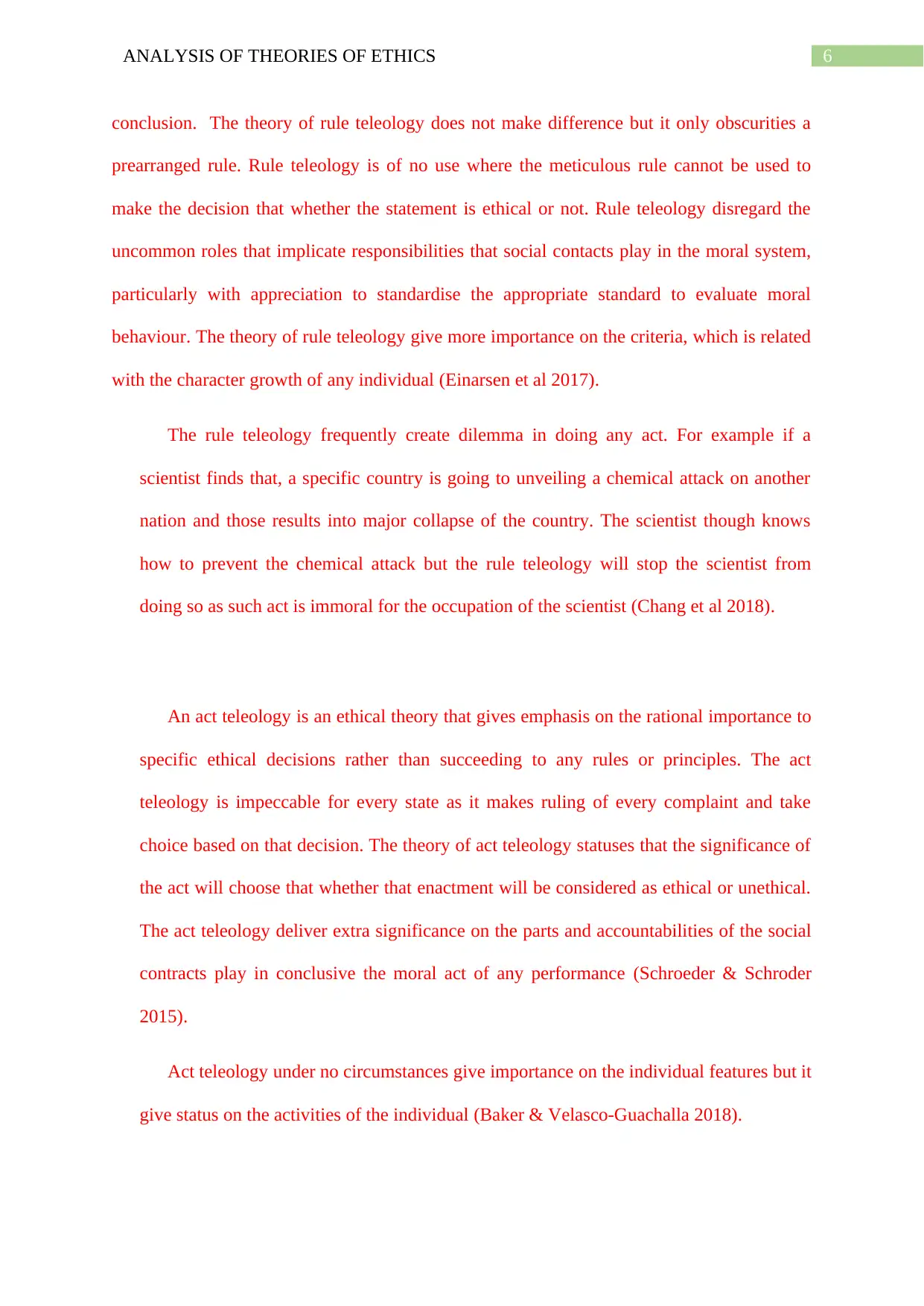
6ANALYSIS OF THEORIES OF ETHICS
conclusion. The theory of rule teleology does not make difference but it only obscurities a
prearranged rule. Rule teleology is of no use where the meticulous rule cannot be used to
make the decision that whether the statement is ethical or not. Rule teleology disregard the
uncommon roles that implicate responsibilities that social contacts play in the moral system,
particularly with appreciation to standardise the appropriate standard to evaluate moral
behaviour. The theory of rule teleology give more importance on the criteria, which is related
with the character growth of any individual (Einarsen et al 2017).
The rule teleology frequently create dilemma in doing any act. For example if a
scientist finds that, a specific country is going to unveiling a chemical attack on another
nation and those results into major collapse of the country. The scientist though knows
how to prevent the chemical attack but the rule teleology will stop the scientist from
doing so as such act is immoral for the occupation of the scientist (Chang et al 2018).
An act teleology is an ethical theory that gives emphasis on the rational importance to
specific ethical decisions rather than succeeding to any rules or principles. The act
teleology is impeccable for every state as it makes ruling of every complaint and take
choice based on that decision. The theory of act teleology statuses that the significance of
the act will choose that whether that enactment will be considered as ethical or unethical.
The act teleology deliver extra significance on the parts and accountabilities of the social
contracts play in conclusive the moral act of any performance (Schroeder & Schroder
2015).
Act teleology under no circumstances give importance on the individual features but it
give status on the activities of the individual (Baker & Velasco-Guachalla 2018).
conclusion. The theory of rule teleology does not make difference but it only obscurities a
prearranged rule. Rule teleology is of no use where the meticulous rule cannot be used to
make the decision that whether the statement is ethical or not. Rule teleology disregard the
uncommon roles that implicate responsibilities that social contacts play in the moral system,
particularly with appreciation to standardise the appropriate standard to evaluate moral
behaviour. The theory of rule teleology give more importance on the criteria, which is related
with the character growth of any individual (Einarsen et al 2017).
The rule teleology frequently create dilemma in doing any act. For example if a
scientist finds that, a specific country is going to unveiling a chemical attack on another
nation and those results into major collapse of the country. The scientist though knows
how to prevent the chemical attack but the rule teleology will stop the scientist from
doing so as such act is immoral for the occupation of the scientist (Chang et al 2018).
An act teleology is an ethical theory that gives emphasis on the rational importance to
specific ethical decisions rather than succeeding to any rules or principles. The act
teleology is impeccable for every state as it makes ruling of every complaint and take
choice based on that decision. The theory of act teleology statuses that the significance of
the act will choose that whether that enactment will be considered as ethical or unethical.
The act teleology deliver extra significance on the parts and accountabilities of the social
contracts play in conclusive the moral act of any performance (Schroeder & Schroder
2015).
Act teleology under no circumstances give importance on the individual features but it
give status on the activities of the individual (Baker & Velasco-Guachalla 2018).
Paraphrase This Document
Need a fresh take? Get an instant paraphrase of this document with our AI Paraphraser
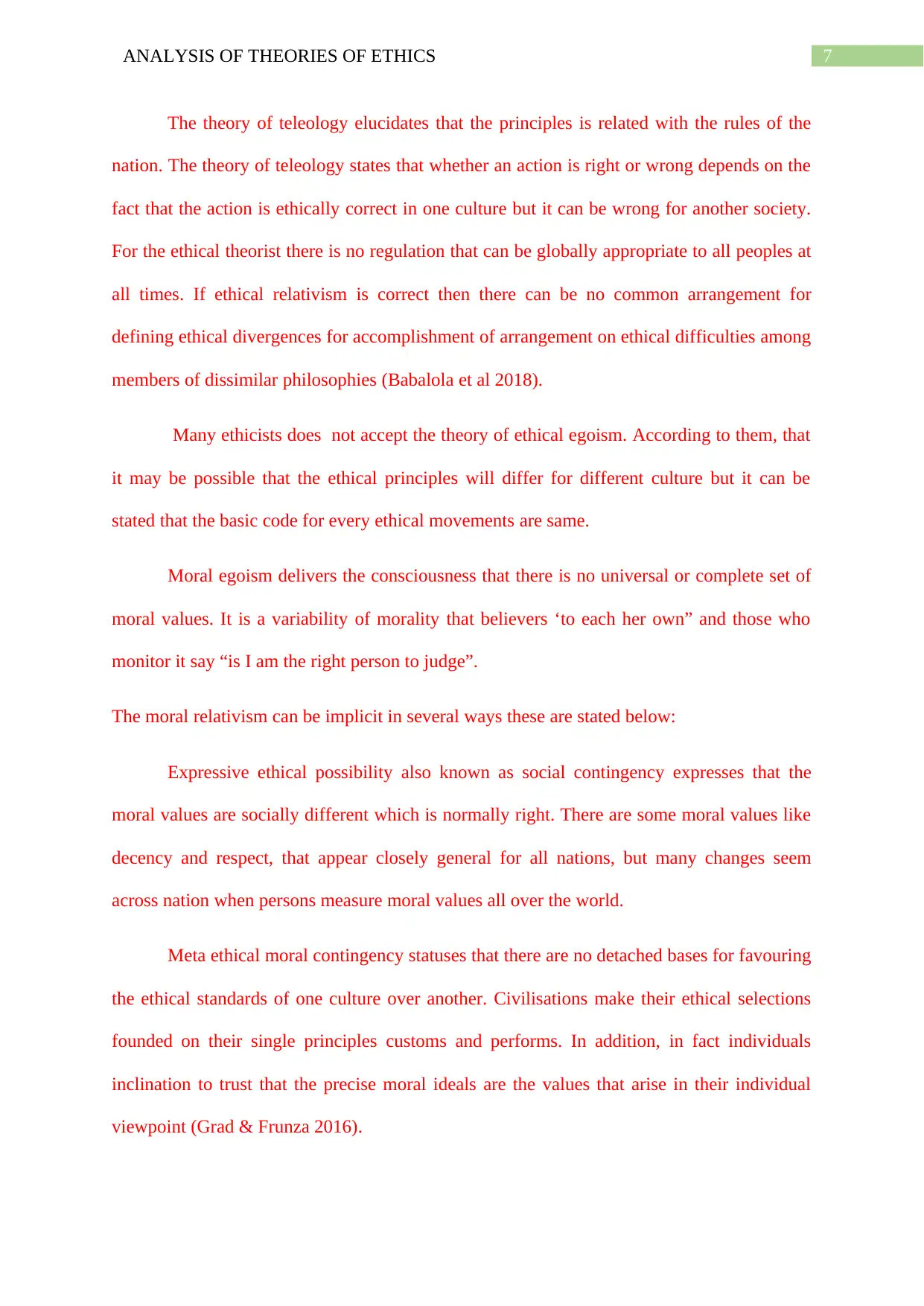
7ANALYSIS OF THEORIES OF ETHICS
The theory of teleology elucidates that the principles is related with the rules of the
nation. The theory of teleology states that whether an action is right or wrong depends on the
fact that the action is ethically correct in one culture but it can be wrong for another society.
For the ethical theorist there is no regulation that can be globally appropriate to all peoples at
all times. If ethical relativism is correct then there can be no common arrangement for
defining ethical divergences for accomplishment of arrangement on ethical difficulties among
members of dissimilar philosophies (Babalola et al 2018).
Many ethicists does not accept the theory of ethical egoism. According to them, that
it may be possible that the ethical principles will differ for different culture but it can be
stated that the basic code for every ethical movements are same.
Moral egoism delivers the consciousness that there is no universal or complete set of
moral values. It is a variability of morality that believers ‘to each her own” and those who
monitor it say “is I am the right person to judge”.
The moral relativism can be implicit in several ways these are stated below:
Expressive ethical possibility also known as social contingency expresses that the
moral values are socially different which is normally right. There are some moral values like
decency and respect, that appear closely general for all nations, but many changes seem
across nation when persons measure moral values all over the world.
Meta ethical moral contingency statuses that there are no detached bases for favouring
the ethical standards of one culture over another. Civilisations make their ethical selections
founded on their single principles customs and performs. In addition, in fact individuals
inclination to trust that the precise moral ideals are the values that arise in their individual
viewpoint (Grad & Frunza 2016).
The theory of teleology elucidates that the principles is related with the rules of the
nation. The theory of teleology states that whether an action is right or wrong depends on the
fact that the action is ethically correct in one culture but it can be wrong for another society.
For the ethical theorist there is no regulation that can be globally appropriate to all peoples at
all times. If ethical relativism is correct then there can be no common arrangement for
defining ethical divergences for accomplishment of arrangement on ethical difficulties among
members of dissimilar philosophies (Babalola et al 2018).
Many ethicists does not accept the theory of ethical egoism. According to them, that
it may be possible that the ethical principles will differ for different culture but it can be
stated that the basic code for every ethical movements are same.
Moral egoism delivers the consciousness that there is no universal or complete set of
moral values. It is a variability of morality that believers ‘to each her own” and those who
monitor it say “is I am the right person to judge”.
The moral relativism can be implicit in several ways these are stated below:
Expressive ethical possibility also known as social contingency expresses that the
moral values are socially different which is normally right. There are some moral values like
decency and respect, that appear closely general for all nations, but many changes seem
across nation when persons measure moral values all over the world.
Meta ethical moral contingency statuses that there are no detached bases for favouring
the ethical standards of one culture over another. Civilisations make their ethical selections
founded on their single principles customs and performs. In addition, in fact individuals
inclination to trust that the precise moral ideals are the values that arise in their individual
viewpoint (Grad & Frunza 2016).
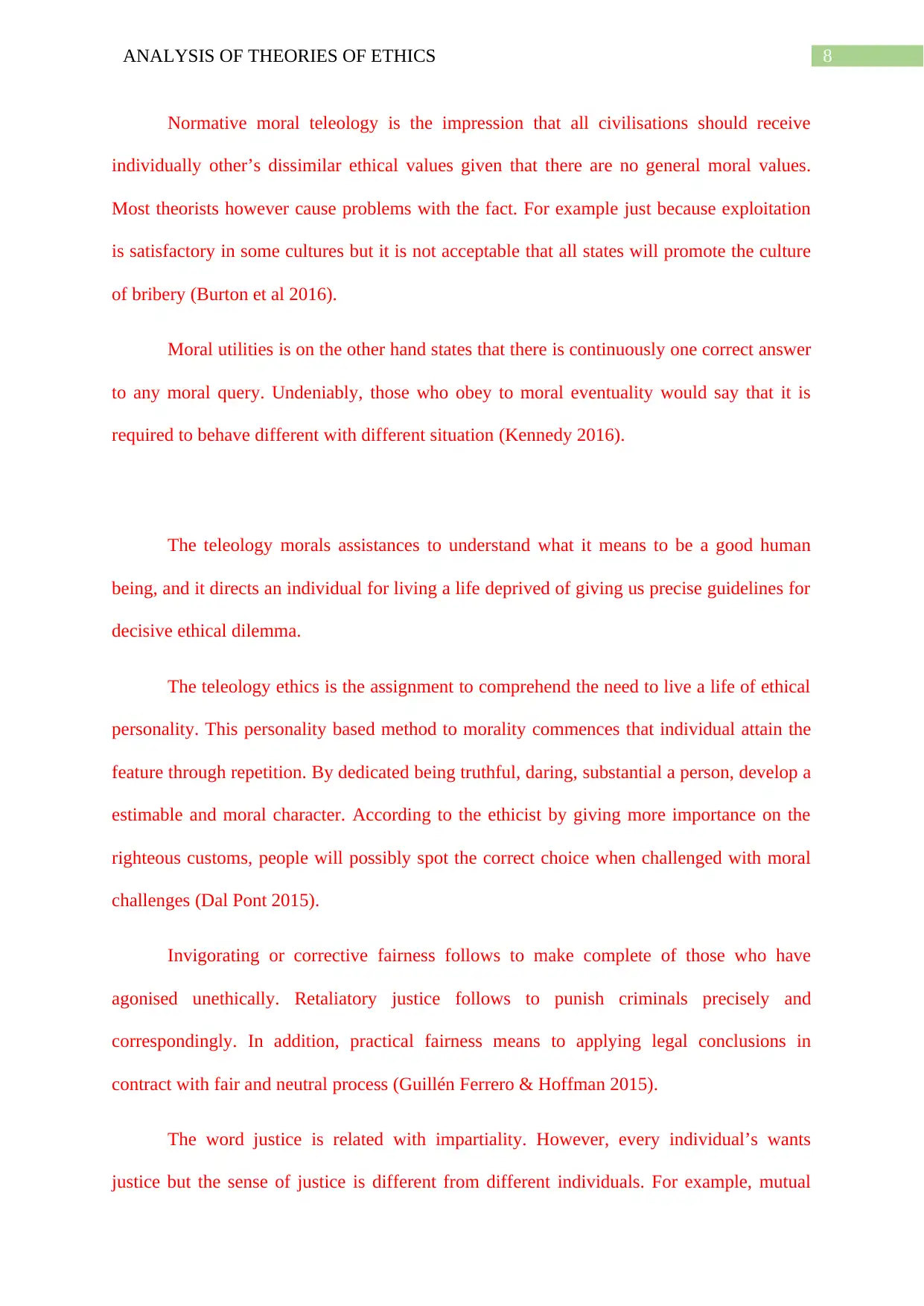
8ANALYSIS OF THEORIES OF ETHICS
Normative moral teleology is the impression that all civilisations should receive
individually other’s dissimilar ethical values given that there are no general moral values.
Most theorists however cause problems with the fact. For example just because exploitation
is satisfactory in some cultures but it is not acceptable that all states will promote the culture
of bribery (Burton et al 2016).
Moral utilities is on the other hand states that there is continuously one correct answer
to any moral query. Undeniably, those who obey to moral eventuality would say that it is
required to behave different with different situation (Kennedy 2016).
The teleology morals assistances to understand what it means to be a good human
being, and it directs an individual for living a life deprived of giving us precise guidelines for
decisive ethical dilemma.
The teleology ethics is the assignment to comprehend the need to live a life of ethical
personality. This personality based method to morality commences that individual attain the
feature through repetition. By dedicated being truthful, daring, substantial a person, develop a
estimable and moral character. According to the ethicist by giving more importance on the
righteous customs, people will possibly spot the correct choice when challenged with moral
challenges (Dal Pont 2015).
Invigorating or corrective fairness follows to make complete of those who have
agonised unethically. Retaliatory justice follows to punish criminals precisely and
correspondingly. In addition, practical fairness means to applying legal conclusions in
contract with fair and neutral process (Guillén Ferrero & Hoffman 2015).
The word justice is related with impartiality. However, every individual’s wants
justice but the sense of justice is different from different individuals. For example, mutual
Normative moral teleology is the impression that all civilisations should receive
individually other’s dissimilar ethical values given that there are no general moral values.
Most theorists however cause problems with the fact. For example just because exploitation
is satisfactory in some cultures but it is not acceptable that all states will promote the culture
of bribery (Burton et al 2016).
Moral utilities is on the other hand states that there is continuously one correct answer
to any moral query. Undeniably, those who obey to moral eventuality would say that it is
required to behave different with different situation (Kennedy 2016).
The teleology morals assistances to understand what it means to be a good human
being, and it directs an individual for living a life deprived of giving us precise guidelines for
decisive ethical dilemma.
The teleology ethics is the assignment to comprehend the need to live a life of ethical
personality. This personality based method to morality commences that individual attain the
feature through repetition. By dedicated being truthful, daring, substantial a person, develop a
estimable and moral character. According to the ethicist by giving more importance on the
righteous customs, people will possibly spot the correct choice when challenged with moral
challenges (Dal Pont 2015).
Invigorating or corrective fairness follows to make complete of those who have
agonised unethically. Retaliatory justice follows to punish criminals precisely and
correspondingly. In addition, practical fairness means to applying legal conclusions in
contract with fair and neutral process (Guillén Ferrero & Hoffman 2015).
The word justice is related with impartiality. However, every individual’s wants
justice but the sense of justice is different from different individuals. For example, mutual
⊘ This is a preview!⊘
Do you want full access?
Subscribe today to unlock all pages.

Trusted by 1+ million students worldwide
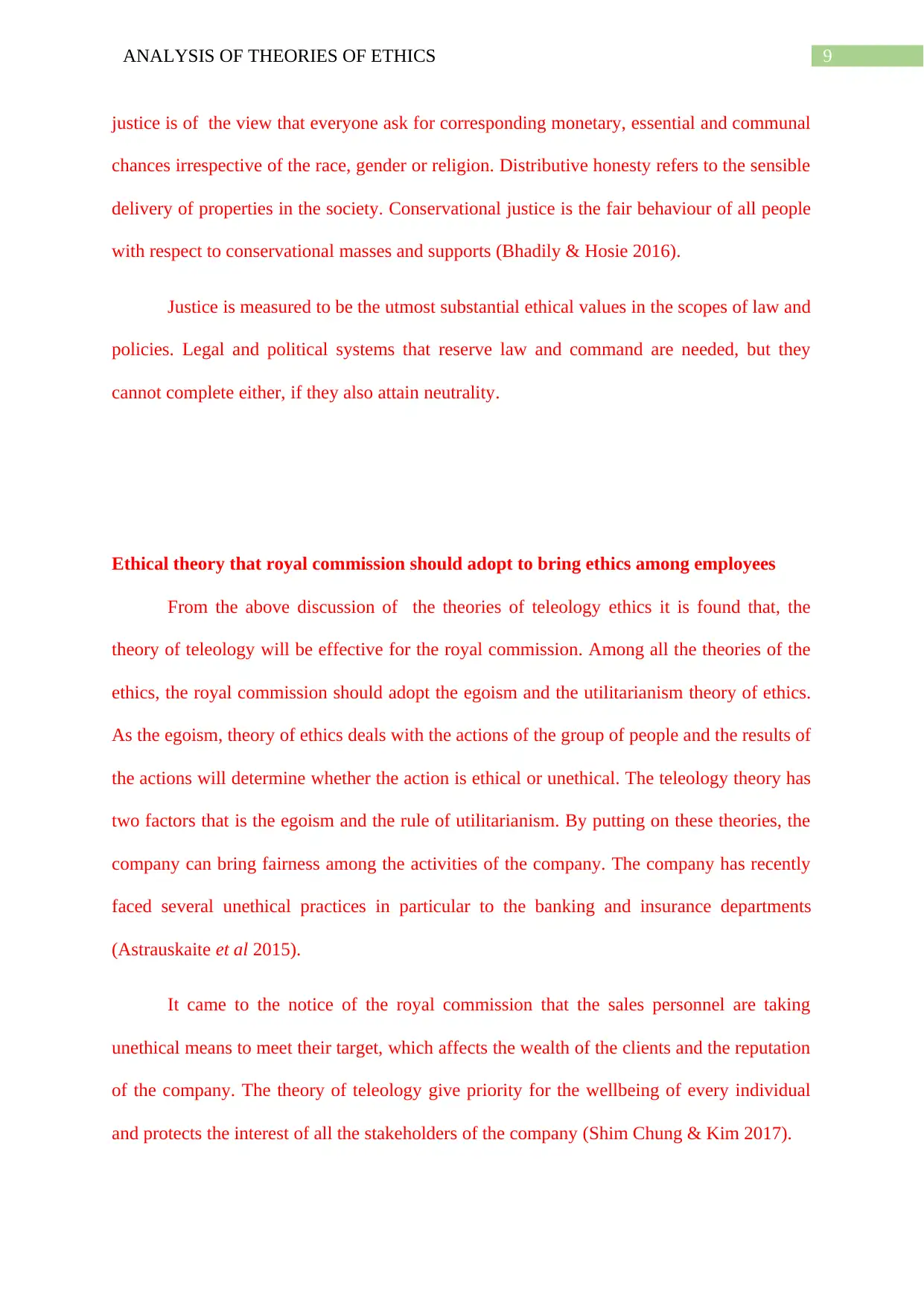
9ANALYSIS OF THEORIES OF ETHICS
justice is of the view that everyone ask for corresponding monetary, essential and communal
chances irrespective of the race, gender or religion. Distributive honesty refers to the sensible
delivery of properties in the society. Conservational justice is the fair behaviour of all people
with respect to conservational masses and supports (Bhadily & Hosie 2016).
Justice is measured to be the utmost substantial ethical values in the scopes of law and
policies. Legal and political systems that reserve law and command are needed, but they
cannot complete either, if they also attain neutrality.
Ethical theory that royal commission should adopt to bring ethics among employees
From the above discussion of the theories of teleology ethics it is found that, the
theory of teleology will be effective for the royal commission. Among all the theories of the
ethics, the royal commission should adopt the egoism and the utilitarianism theory of ethics.
As the egoism, theory of ethics deals with the actions of the group of people and the results of
the actions will determine whether the action is ethical or unethical. The teleology theory has
two factors that is the egoism and the rule of utilitarianism. By putting on these theories, the
company can bring fairness among the activities of the company. The company has recently
faced several unethical practices in particular to the banking and insurance departments
(Astrauskaite et al 2015).
It came to the notice of the royal commission that the sales personnel are taking
unethical means to meet their target, which affects the wealth of the clients and the reputation
of the company. The theory of teleology give priority for the wellbeing of every individual
and protects the interest of all the stakeholders of the company (Shim Chung & Kim 2017).
justice is of the view that everyone ask for corresponding monetary, essential and communal
chances irrespective of the race, gender or religion. Distributive honesty refers to the sensible
delivery of properties in the society. Conservational justice is the fair behaviour of all people
with respect to conservational masses and supports (Bhadily & Hosie 2016).
Justice is measured to be the utmost substantial ethical values in the scopes of law and
policies. Legal and political systems that reserve law and command are needed, but they
cannot complete either, if they also attain neutrality.
Ethical theory that royal commission should adopt to bring ethics among employees
From the above discussion of the theories of teleology ethics it is found that, the
theory of teleology will be effective for the royal commission. Among all the theories of the
ethics, the royal commission should adopt the egoism and the utilitarianism theory of ethics.
As the egoism, theory of ethics deals with the actions of the group of people and the results of
the actions will determine whether the action is ethical or unethical. The teleology theory has
two factors that is the egoism and the rule of utilitarianism. By putting on these theories, the
company can bring fairness among the activities of the company. The company has recently
faced several unethical practices in particular to the banking and insurance departments
(Astrauskaite et al 2015).
It came to the notice of the royal commission that the sales personnel are taking
unethical means to meet their target, which affects the wealth of the clients and the reputation
of the company. The theory of teleology give priority for the wellbeing of every individual
and protects the interest of all the stakeholders of the company (Shim Chung & Kim 2017).
Paraphrase This Document
Need a fresh take? Get an instant paraphrase of this document with our AI Paraphraser
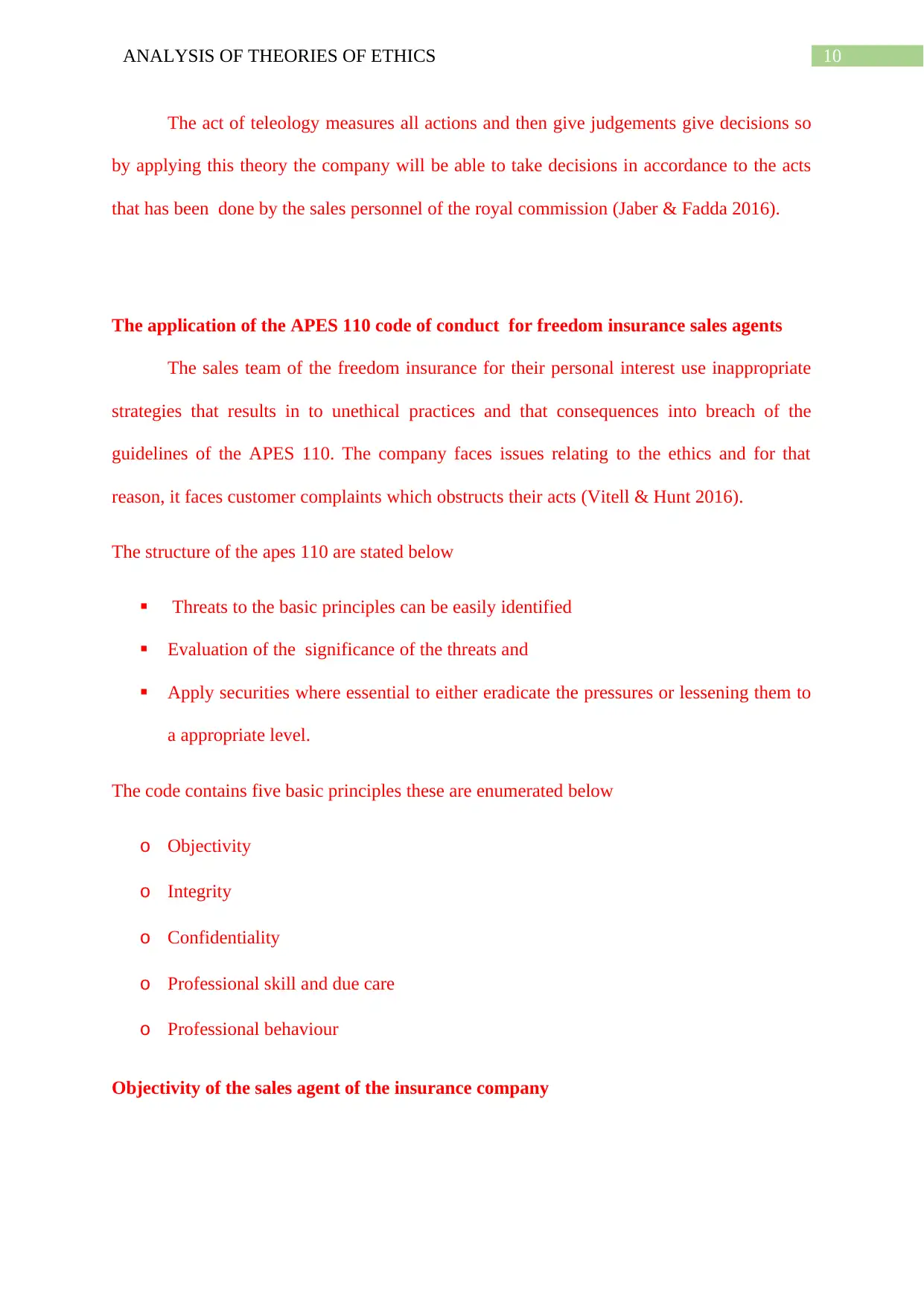
10ANALYSIS OF THEORIES OF ETHICS
The act of teleology measures all actions and then give judgements give decisions so
by applying this theory the company will be able to take decisions in accordance to the acts
that has been done by the sales personnel of the royal commission (Jaber & Fadda 2016).
The application of the APES 110 code of conduct for freedom insurance sales agents
The sales team of the freedom insurance for their personal interest use inappropriate
strategies that results in to unethical practices and that consequences into breach of the
guidelines of the APES 110. The company faces issues relating to the ethics and for that
reason, it faces customer complaints which obstructs their acts (Vitell & Hunt 2016).
The structure of the apes 110 are stated below
Threats to the basic principles can be easily identified
Evaluation of the significance of the threats and
Apply securities where essential to either eradicate the pressures or lessening them to
a appropriate level.
The code contains five basic principles these are enumerated below
o Objectivity
o Integrity
o Confidentiality
o Professional skill and due care
o Professional behaviour
Objectivity of the sales agent of the insurance company
The act of teleology measures all actions and then give judgements give decisions so
by applying this theory the company will be able to take decisions in accordance to the acts
that has been done by the sales personnel of the royal commission (Jaber & Fadda 2016).
The application of the APES 110 code of conduct for freedom insurance sales agents
The sales team of the freedom insurance for their personal interest use inappropriate
strategies that results in to unethical practices and that consequences into breach of the
guidelines of the APES 110. The company faces issues relating to the ethics and for that
reason, it faces customer complaints which obstructs their acts (Vitell & Hunt 2016).
The structure of the apes 110 are stated below
Threats to the basic principles can be easily identified
Evaluation of the significance of the threats and
Apply securities where essential to either eradicate the pressures or lessening them to
a appropriate level.
The code contains five basic principles these are enumerated below
o Objectivity
o Integrity
o Confidentiality
o Professional skill and due care
o Professional behaviour
Objectivity of the sales agent of the insurance company
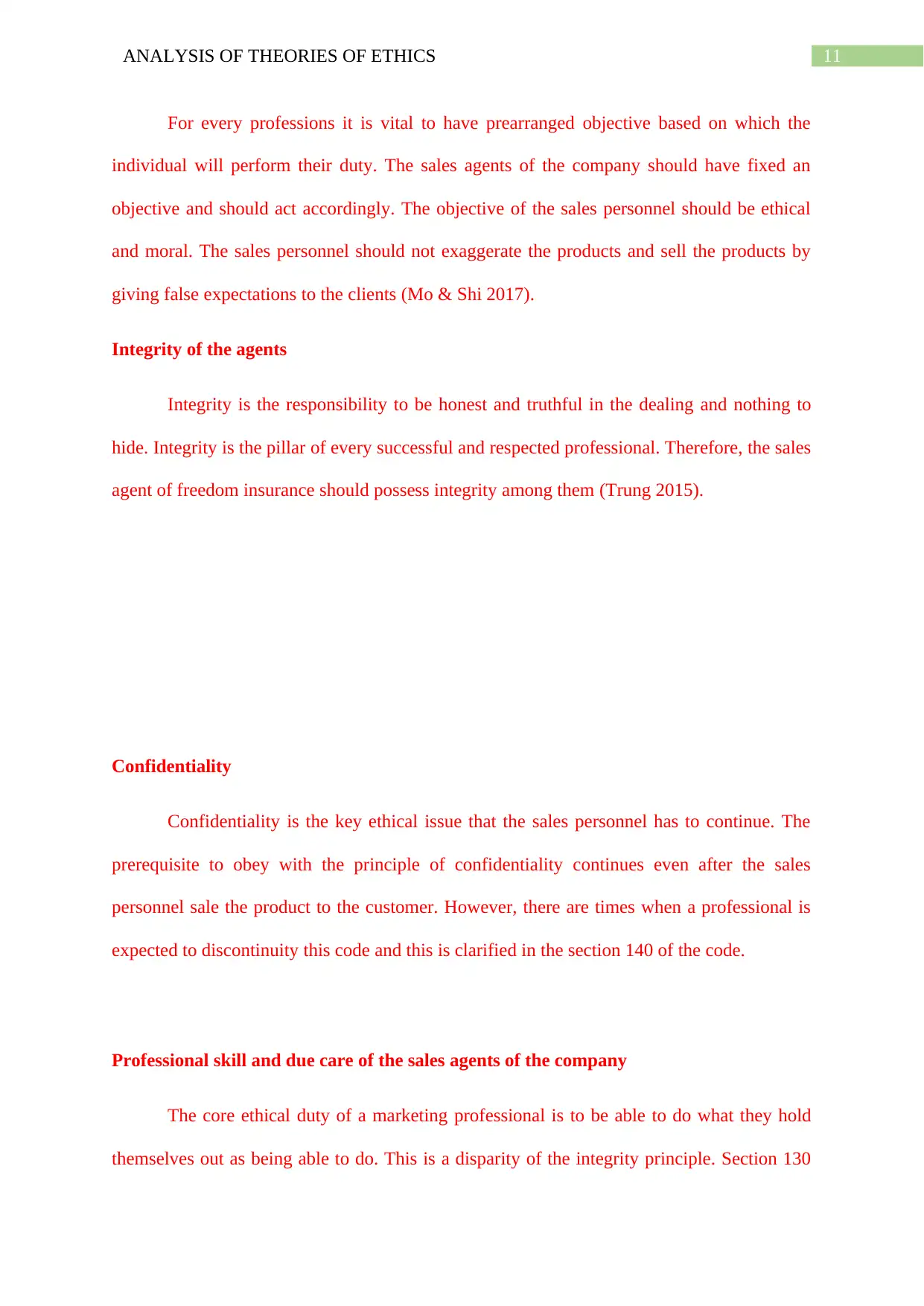
11ANALYSIS OF THEORIES OF ETHICS
For every professions it is vital to have prearranged objective based on which the
individual will perform their duty. The sales agents of the company should have fixed an
objective and should act accordingly. The objective of the sales personnel should be ethical
and moral. The sales personnel should not exaggerate the products and sell the products by
giving false expectations to the clients (Mo & Shi 2017).
Integrity of the agents
Integrity is the responsibility to be honest and truthful in the dealing and nothing to
hide. Integrity is the pillar of every successful and respected professional. Therefore, the sales
agent of freedom insurance should possess integrity among them (Trung 2015).
Confidentiality
Confidentiality is the key ethical issue that the sales personnel has to continue. The
prerequisite to obey with the principle of confidentiality continues even after the sales
personnel sale the product to the customer. However, there are times when a professional is
expected to discontinuity this code and this is clarified in the section 140 of the code.
Professional skill and due care of the sales agents of the company
The core ethical duty of a marketing professional is to be able to do what they hold
themselves out as being able to do. This is a disparity of the integrity principle. Section 130
For every professions it is vital to have prearranged objective based on which the
individual will perform their duty. The sales agents of the company should have fixed an
objective and should act accordingly. The objective of the sales personnel should be ethical
and moral. The sales personnel should not exaggerate the products and sell the products by
giving false expectations to the clients (Mo & Shi 2017).
Integrity of the agents
Integrity is the responsibility to be honest and truthful in the dealing and nothing to
hide. Integrity is the pillar of every successful and respected professional. Therefore, the sales
agent of freedom insurance should possess integrity among them (Trung 2015).
Confidentiality
Confidentiality is the key ethical issue that the sales personnel has to continue. The
prerequisite to obey with the principle of confidentiality continues even after the sales
personnel sale the product to the customer. However, there are times when a professional is
expected to discontinuity this code and this is clarified in the section 140 of the code.
Professional skill and due care of the sales agents of the company
The core ethical duty of a marketing professional is to be able to do what they hold
themselves out as being able to do. This is a disparity of the integrity principle. Section 130
⊘ This is a preview!⊘
Do you want full access?
Subscribe today to unlock all pages.

Trusted by 1+ million students worldwide
1 out of 18
Related Documents
Your All-in-One AI-Powered Toolkit for Academic Success.
+13062052269
info@desklib.com
Available 24*7 on WhatsApp / Email
![[object Object]](/_next/static/media/star-bottom.7253800d.svg)
Unlock your academic potential
Copyright © 2020–2026 A2Z Services. All Rights Reserved. Developed and managed by ZUCOL.





